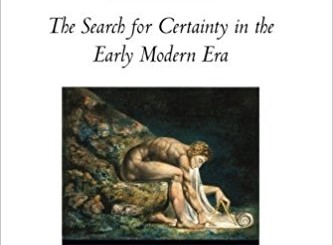The topic of certitude is much debated today. On one side, commentators such as Charles Krauthammer urge us to achieve “moral clarity.” On the other, those like George Will contend that the greatest present threat to civilization is an excess of certitude. To address this uncomfortable debate, Susan Schreiner turns to the intellectuals of early modern Europe, a period when thought was still fluid and had not yet been reified into the form of rationality demanded by the eighteenth and nineteenth centuries.
Schreiner argues that Europe in the sixteenth century was preoccupied with concerns similar to ours; both the desire for certainty — especially religious certainty — and warnings against certainty permeated the earlier era. Digging beneath overt theological and philosophical problems, she tackles the underlying fears of the period as she addresses questions of salvation, authority, the rise of skepticism, the outbreak of religious violence, the discernment of spirits, and the ambiguous relationship between appearance and reality.
In her examination of the history of theological polemics and debates (as well as other genres), Schreiner sheds light on the repeated evaluation of certainty and the recurring fear of deception. Among the texts she draws on are Montaigne’s Essays, the mystical writings of Teresa of Avila, the works of Reformation fathers William of Occam, Luther, Thomas Muntzer, and Thomas More; and the dramas of Shakespeare. The result is not a book about theology, but rather about the way in which the concern with certitude determined the theology, polemics and literature of an age.
Review
“With characteristic breadth of mind and vision, Schreiner combines deep knowledge and understanding of the overlapping fields of theology, philosophy, spirituality, culture and literature in order to project a history of the erratic human mind. Such an adventurous, interdisciplinary approach is often vulnerable to exposure of superficiality and pretentiousness, but happily not in her case. Every sentence she writes is formed in a way that conveys illumination to the reader.”
— Ian Hazlett, Professor of Ecclesiastical History, University of Glasgow.
“This immensely interesting and thoughtful book places the quest for ‘certainty’ at the center of that era historians have recently come to call ‘early modern.’ A sensitive reader of texts, whether theological or literary, Schreiner places Protestant and Catholic reformers, Renaissance humanists and dramatists, and philosophical and literary skeptics on the same stage, all probing the same unsettling questions about human ends and how we can come to know them with any certitude. This is a book all students of early modern European history will have to come to terms with.”
— John Van Engen, author of Sisters and Brothers of the Common Life: The Devotio Moderna and the World of the Later Middle Ages
“Susan Schreiner’s study of the search for certainty offers a masterful perspective on a central and many-faceted problem of the early modern era. The book is characterized by a mastery of sources primary and secondary and by profound insight into the intellectual and cultural transitions from the Middle Ages into modernity, ranging from philosophical problems of the fourteenth and fifteenth centuries, to Luther and Tyndale in the early Reformation, to Montaigne and Shakespeare at the end of the sixteenth century. This is a rich, rewarding, and highly significant study.”
— Richard A. Muller, P. J. Zondervan Professor of Historical Theology, Calvin Theological Seminary
Although this study extends in scope from an account of late medieval epistemology to Montaigne and Shakespeare, it rightfully belongs in a series devoted to historical theology.”–Journal of Ecclesiastical History
“Susan Schreiner’s wide-ranging study examines intellectuals’ concerns over certainty…This method enables her to engage an impressive array of subjects and contexts…Her narrative thus makes many claims and raises many questions for further consideration.”–Sixteenth Century Journal
“This is the work of a mature scholar who combines rigorous historical analysis and theological nous with balanced judgement and deep respect for early modern ways of thinking.”– Harald Braun, Renaissance Quarterly
About the Author
Susan E. Schreiner is Professor of the History of Christianity and Theology, University of Chicago Divinity School. Her teaching and research focus on the early modern era in Europe, including the Protestant and Catholic Reformations and the Renaissance.

